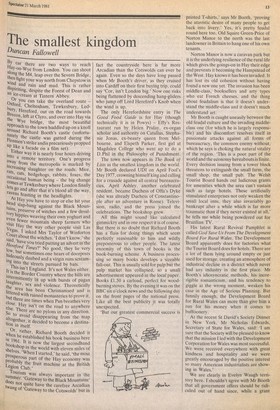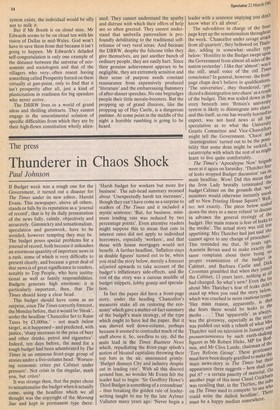The smallest kingdom
Duncan Fallowell
BY car there are two ways to reach Hay-on-Wye from London. You can shoot along the M4, leap over the Severn Bridge, then fight your way north from Chepstow in wind and rain and mud. This is rather dispiriting, despite the Forest of Dean and an ice-cream at Tintern Abbey. Or you can take the overland route Oxford, Cheltenham, Tewkesbury, Ledl bury, Hereford, out on the road towards Brecon, left at Clyro, and over into Hay via the Wye bridge, the most beautiful approach to the town huddled up on a knoll around Richard Booth's castle (unfortunately the castle was gutted during the Firemen's strike andis precariously propped ulp like a facade On a film set). Either way it is nearly four hours driving into a remote territory. One's progress away from the metropolis is marked by increasing slaughter on the roads. Mice, rats, cats, hedgehogs, rabbits, foxes, the occasional human being — the big change Comes at Tewkesbury where London finally lets go and after that it's blood all the way, ravens feasting in the headlights. At Hay you have to stop or else hit your head slap-bang against the Black Mountains, preserve of witches and a few desultory hippies weaving their own yoghurt and even fewer mountain sheep farmers who visit Hay the way other people visit Las ,Vegas. I asked Mrs Taylor of Winforton Court about the witches. don't know,' she said, 'have you tried putting an advert in the Hereford Times?' No good, they lie very low, but sometimes one hears of doorposts hideously daubed and a virgin runs screaming into the streets pursued by bats. This isn't England. It's not Wales either. It is the Border Country where the hills are intermittently lit up with bursts of pagan laughter, sex and violence. Theoretically the area has been Christianised and is littered with ruined monasteries to prove it, but there are times when Pan breathes very Close. Hay isn't on the road to anywhere else. There are no pylons in any direction. So to avoid disappearing from the map altogether, it decided to become a destination in itself. Or, rather, Richard Booth decided it When he established his book business here in 1961. It is now the largest secondhand bookshop in the world with eleven miles of shelves. 'When I started,' he said, 'the most Prosperous part of the Hay economy was Probably the fruit machine at the British Legion Club.' Tourism was always important in the summer. 'Gateway to the Black Mountains' does not quite have the carefree Arcadian twang of 'Gateway to the Cotswolds' but in fact the countryside here is far more Arcadian than the Cotswolds can ever be again. Even so the days have long passed when Mr Booth's driver, as they cruised into Cardiff on their first buying trip, could say 'Cor, isn't London big.' Now one risks being flattened by descending hang-gliders who jump off Lord Hereford's Knob when the wind is up.
The only Herefordshire entry in The Good Food Guide is for Hay (though technically it is in Powys) — Effy's Restaurant run by Helen Priday, ex-organ scholar and authority on Catullus, Stephanie Jonas, ex-beauty queen from Melbourne, and Elspeth Parker, first girl at Magdalen College who went up to do a D.Phil in the Philosophy of Punishment.
The town now appears in The Boot( of Lists as the smallest kingdom in the world. Mr Booth declared UDI on April Fool's Day 1977, crowning himself king and calling for a crusade against all central bureaucracies. April Ashley, another celebrated resident, became Duchess of Offa's Dyke (she was already Duchess of Constantinople after an adventure in Rome). Television, radio, and the press joined the celebrations. The bookshop grew.
All this might sound like calculated gimmickry and in one respect it is of course. But there is no doubt that Richard Booth has a -flair. for doing things which seem perfectly reasonable to him and wildly preposterous to other people. The latest enormity of this town of books is the book-burning scheme. A business processing so many books develops a sizeable fall-out. This is usually sold for pulp but the pulp market has collapsed, so a small advertisement appeared in the local paper. Books £1.50 a carload, perfect for woodburning stoves. By the evening it was on the BBC six o'clock news and the following day on the front pages of the national press. Like all the best publicity it was totally unexpected.
'But our greatest commercial success is printed T-shirts,' says Mr Booth, 'proving the atavistic desire of many people to get back into livery.' .Yes, it's pretty feudal round here too. Old Squire Green-Price of Norton Manor to the north was the last landowner in Britain to hang one of his own tenants.
Norton Manor is now a caravan park but it is the underlying resilience of the rural life which gives the goings-on in Hay their edge and prevents it becoming the Hampstead of the West. Hay knows it has been invaded. It has lost its old cohesion without having found a new one yet. The invasion has been middle-class, booksellers and arty types who eat French cheeses, and the thing about feudalism is that it doesn't understand the middle-class and it doesn't much understand art.
Mr Booth is caught uneasily between the old feudal culture and the invading middleclass one (for which he is largely responsible) and his discomfort resolves itself in passionate attacks against all forms of bureaucracy, the common enemy without, which he says is choking the natural vitality of the region. 'This is a poor part of the world and the economy hereabouts is finite. Every decision issuing from a tower block threatens to extinguish the small farm, the small shop, the small pub. The Welsh Tourist Board hands out ludicrous grants for amenities which the area can't sustain such as large hotels. These artificially stimulated enterprises not only weaken the small local inns, they also invariably go bankrupt after a while which is far more traumatic than if they never existed at all,' he tells me while being powdered out for Brazilian TV.
His latest Rural Revival Pamphlet is called God Save Us From The Development Board For Rural Wales. The Development Board apparently does for factories what the Tourist Board does for hotels. There are a lot of them lying around empty or just used for storage, creating an atmosphere of industrial decline in a district which never had any industry in the first place. Mr Booth's idiosyncratic methods, his incorrigible romanticism, and his tendency to giggle at the wrong moment, weaken his case in the Age of Serious Planning, But funnily enough, the Development Board for Rural Wales can more than give him a run for his money when it comes to buffoonery.
At the recent St David's Society Dinner in New York, Mr Nicholas Edwards, Secretary of State for Wales, said: 'I am sure that the Society will be pleased to know that the mission I led with the Development Corporation for Wales was most successful. We were received everywhere with great kindness and hospitality and we were greatly encouraged by the positive interest so many American industrialists are showing in Wales.'
We are clearly in Evelyn Waugh territory here. I shouldn't agree with Mr Booth that all government offers should be ridiculed out of hand since, while a grant system exists, the individual would be silly not to milk it.
But if Mr Booth is on cloud nine, Mr Edwards seems to be on cloud ten with his vision of Dallas in mid-Wales. God won't have to save them from that because it isn't going to happen. Mr Edwards's deluded self-congratulation is only one example of the distance between the universe of economists and sociologists and that of the villagers who very\ often resent having something called Prosperity forced on them virtually at gun-point, only to find that it isn't prosperity after all, just a kind of plasticisation in readiness for big spenders who never arrive.
The DBRW lives in a world of grand ideas and thrilling abstracts. They cannot engage in the unsentimental solution of specific difficulties from which they are by their high-flown constitution wholly alien ated. They cannot understand the apathy and distrust with which their offers of help are so often greeted. They cannot understand that umbrella paternalism is profoundly debilitating to the traditional selfreliance of very rural areas. And because the DBRW, despite the fulsome titles they give themselves, are just another bunch of ordinary people, they are easily hurt. Since their genuine achievement appears to be negligible, they are extremely sensitive and their sense of purpose needs constant reassurance from expensively produced 'literature' and the embarrassing flummery of after-dinner speeches. No one begrudges people their little morale-boosters. But the propping up of grand illusions, like the propping up of Hay Castle, is a dangerous pastime. At some point in the middle of the night a horrible rumbling is going to be heard.







































 Previous page
Previous page